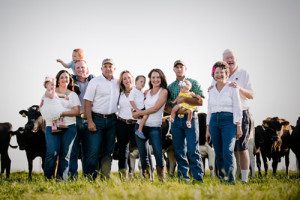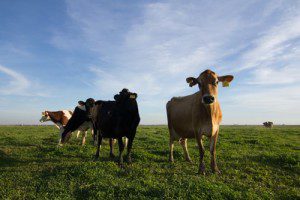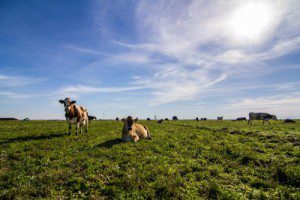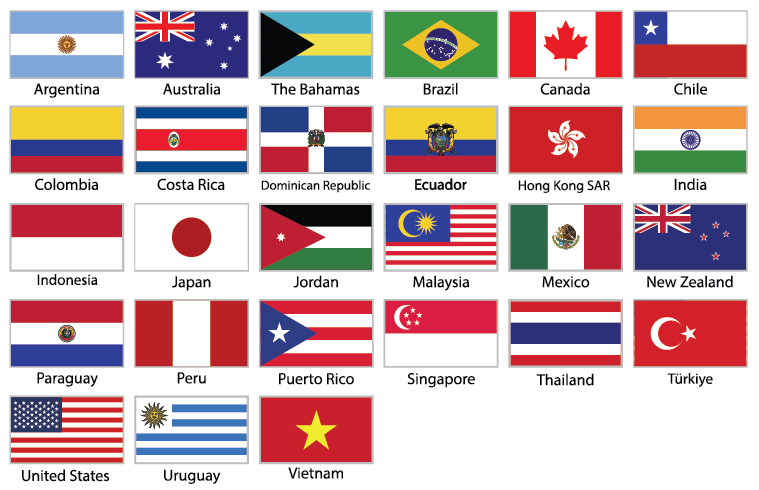 Fresno, California
Fresno, California
“Every cow has a name, and every cow is personally handled by the family,” said Aaron McAfee, COO of Organic Pastures Dairy Company in Fresno, California. “That pretty much sums up how we feel about the animals on our farm.”
As a leader in nature-friendly farm practices, Organic Pastures Dairy Company is rooted in the innovative farming and dairy endeavors that first originated with the McAfee’s grandparents in the 1950s. Fifth generation farmers, the McAfee brothers, Mark, Eric, Adam and Andrew, grew up on the family farm and dairy in the 1960’s and recall fond memories of feeding calves, milking cows, and playing endless hours on haystacks.
When the boys inherited the land from their grandparents, however, they were too young to farm the land themselves. Instead, they leased the land to other farmers. In the early 1980s, however, they returned to their family roots. Instead of dairy farming, however, they planted 160 acres of apples, which they exported to the Asian market. The international export market loved their apples, but the brothers kept looking for ways to connect more locally with their consumers.
 Innovative dairy farm puts “cows first”
Innovative dairy farm puts “cows first”
In the mid 1990’s, the McAfee family transitioned their farm to “certified organic” to provide premium quality organic apples to their community. But they still had more than 400 acres of land they were leasing to other farmers and not farming themselves.
In the late 1990’s, Mark McAfee, the eldest of the brothers, decided to utilize the organic alfalfa grown on the farm and turn their entire operations over to dairy farming. They designed the dairy farm to be environmentally conscious, organic, sustainable, consumer connected, and local. This included introducing humane farming practices for the 320 cows living on the farm at that time.
McAfee says that USDA organic standards requires cows certified as pasture-raised be out on pasture at least four months out of the year. “That wasn’t enough for us,” says McAfee. “In our warm California climate, we put the cows on green pastures 365 days a year. We want them to enjoy a natural life and a fresh diet.”
Part of that natural life also meant keeping the cows from living in a milk barn tethered to milking machines. The family invented a unique mobile milk barn that traveled the farm twice a day.
“We brought the milk barn to the cows,” says McAfee. “When the milking was done, the cows walked back out onto the pasture. Then we drove the milk barn to another location.”
 Humane care of cows leads to raw milk production
Humane care of cows leads to raw milk production
The McAfees had only been dairy farmers for 6 months, producing pasteurized milk, when they learned a Los Angeles-based raw milk producer had discontinued the sale of raw milk. Raw milk can only be distributed statewide because of the time from farmer to market, so they felt producing it would bring them in closer relationship to their customers.
They also knew few farms could produce raw milk and that the high level of care they provided their cows made them a definite contender in this market. “Raw milk is cold-filtered and goes straight from the cow to the bottle, so it has to come from very clean and well-cared for animals,” said McAfee.
In 2000, Organic Pastures Dairy Farm launched their 100% USDA certified organic, Grade A, raw milk, which turned out to be in high demand from California consumers. The demand lead them to build their own creamery and processing plant to make a whole host of raw milk products, including butter, cream, cheese, whole milk, skim milk, and kefir (drinkable yogurt).
“Most milk products trucked to a processing plant are co-mingled,” explains McAfee. “That doesn’t happen with us. We don’t sell to a processor, we are the processor. This means our product has to be the very best. It increases our responsibility to the consumer. We know who is buying and they know who is selling it. We want to be very transparent.”
Organic Pastures Dairy Farm also launched their own distribution operations, going from one truck in southern California to 24 trucks now serving the entire state. “We have become the producer, processor, and distributor to ensure the quality of our dairy products through the entire process,” says McAfee. “That’s simply not something most farmers do.”
Farm becomes Certified Humane®
Today 1,200 cows live on Organic Pastures Dairy Farm, grazing on pasture lands rather than confinement to milk barns. Currently, a state of the art permanent milk barn is under construction.
“Cows still remain on pasture all day, strolling into the barn at milking time and then making their way back out onto pasture as soon as they’re done,” said McAfee. “The goal will always be to keep our cows happy.”
The farm’s transparency for how they raise and care for their animals has become well-known in the local community, thanks to their willingness to host tours and events and share their farm practices with visitors.
Once a year, Organic Pastures hosts a day long annual event called Camping with Cows where they provide free farm tours for visitors wanting to see how a dairy farm operates. “But farm tours can be arranged at any time,” says McAfee. “We love to show people what we’re doing and how the cows spend their days on pasture.”
Part of their transparency also includes posting their food safety plan for operating a raw milk dairy on their website. “Technically we’re giving away the keys to what we do,” said McAfee. “But the brilliance is not in the plan, but in the execution, and we do that very well here. We have set a high bar for this type of farming.”
The McAfee family learned about the Certified Humane® program when Sprouts suggested they become Certified Humane®.
“Right away, we realized there was an incentive for us to do this – to let people know how we care for our cows,” said McAfee. “When a third party inspector is verifying everything, it gives consumers a confidence level that what they are eating is made with sustainable practices in mind. Any time we can prove what’s happening on the farm and not just asking people to trust us, that’s great.”
Organic Pastures values their certifications and labels as a way of assuring consumers that only the best and most humane practices are used on their farms. Their labels include: Certified Humane®, Certified Organic, Kosher, and USDA-approved. Products are available in California only except for cheese, which is distributed across the U.S. The Company has been recognized repeatedly in independent NFO (National Farmers Organization) tests as having the best milk taste of the dairies surveyed.

Organic Pastures Dairy Company
Posted: August 19, 2015 by Adele Douglass
“Every cow has a name, and every cow is personally handled by the family,” said Aaron McAfee, COO of Organic Pastures Dairy Company in Fresno, California. “That pretty much sums up how we feel about the animals on our farm.”
As a leader in nature-friendly farm practices, Organic Pastures Dairy Company is rooted in the innovative farming and dairy endeavors that first originated with the McAfee’s grandparents in the 1950s. Fifth generation farmers, the McAfee brothers, Mark, Eric, Adam and Andrew, grew up on the family farm and dairy in the 1960’s and recall fond memories of feeding calves, milking cows, and playing endless hours on haystacks.
When the boys inherited the land from their grandparents, however, they were too young to farm the land themselves. Instead, they leased the land to other farmers. In the early 1980s, however, they returned to their family roots. Instead of dairy farming, however, they planted 160 acres of apples, which they exported to the Asian market. The international export market loved their apples, but the brothers kept looking for ways to connect more locally with their consumers.
In the mid 1990’s, the McAfee family transitioned their farm to “certified organic” to provide premium quality organic apples to their community. But they still had more than 400 acres of land they were leasing to other farmers and not farming themselves.
In the late 1990’s, Mark McAfee, the eldest of the brothers, decided to utilize the organic alfalfa grown on the farm and turn their entire operations over to dairy farming. They designed the dairy farm to be environmentally conscious, organic, sustainable, consumer connected, and local. This included introducing humane farming practices for the 320 cows living on the farm at that time.
McAfee says that USDA organic standards requires cows certified as pasture-raised be out on pasture at least four months out of the year. “That wasn’t enough for us,” says McAfee. “In our warm California climate, we put the cows on green pastures 365 days a year. We want them to enjoy a natural life and a fresh diet.”
Part of that natural life also meant keeping the cows from living in a milk barn tethered to milking machines. The family invented a unique mobile milk barn that traveled the farm twice a day.
“We brought the milk barn to the cows,” says McAfee. “When the milking was done, the cows walked back out onto the pasture. Then we drove the milk barn to another location.”
The McAfees had only been dairy farmers for 6 months, producing pasteurized milk, when they learned a Los Angeles-based raw milk producer had discontinued the sale of raw milk. Raw milk can only be distributed statewide because of the time from farmer to market, so they felt producing it would bring them in closer relationship to their customers.
They also knew few farms could produce raw milk and that the high level of care they provided their cows made them a definite contender in this market. “Raw milk is cold-filtered and goes straight from the cow to the bottle, so it has to come from very clean and well-cared for animals,” said McAfee.
In 2000, Organic Pastures Dairy Farm launched their 100% USDA certified organic, Grade A, raw milk, which turned out to be in high demand from California consumers. The demand lead them to build their own creamery and processing plant to make a whole host of raw milk products, including butter, cream, cheese, whole milk, skim milk, and kefir (drinkable yogurt).
“Most milk products trucked to a processing plant are co-mingled,” explains McAfee. “That doesn’t happen with us. We don’t sell to a processor, we are the processor. This means our product has to be the very best. It increases our responsibility to the consumer. We know who is buying and they know who is selling it. We want to be very transparent.”
Organic Pastures Dairy Farm also launched their own distribution operations, going from one truck in southern California to 24 trucks now serving the entire state. “We have become the producer, processor, and distributor to ensure the quality of our dairy products through the entire process,” says McAfee. “That’s simply not something most farmers do.”
Farm becomes Certified Humane®
Today 1,200 cows live on Organic Pastures Dairy Farm, grazing on pasture lands rather than confinement to milk barns. Currently, a state of the art permanent milk barn is under construction.
“Cows still remain on pasture all day, strolling into the barn at milking time and then making their way back out onto pasture as soon as they’re done,” said McAfee. “The goal will always be to keep our cows happy.”
The farm’s transparency for how they raise and care for their animals has become well-known in the local community, thanks to their willingness to host tours and events and share their farm practices with visitors.
Once a year, Organic Pastures hosts a day long annual event called Camping with Cows where they provide free farm tours for visitors wanting to see how a dairy farm operates. “But farm tours can be arranged at any time,” says McAfee. “We love to show people what we’re doing and how the cows spend their days on pasture.”
Part of their transparency also includes posting their food safety plan for operating a raw milk dairy on their website. “Technically we’re giving away the keys to what we do,” said McAfee. “But the brilliance is not in the plan, but in the execution, and we do that very well here. We have set a high bar for this type of farming.”
The McAfee family learned about the Certified Humane® program when Sprouts suggested they become Certified Humane®.
“Right away, we realized there was an incentive for us to do this – to let people know how we care for our cows,” said McAfee. “When a third party inspector is verifying everything, it gives consumers a confidence level that what they are eating is made with sustainable practices in mind. Any time we can prove what’s happening on the farm and not just asking people to trust us, that’s great.”
Organic Pastures values their certifications and labels as a way of assuring consumers that only the best and most humane practices are used on their farms. Their labels include: Certified Humane®, Certified Organic, Kosher, and USDA-approved. Products are available in California only except for cheese, which is distributed across the U.S. The Company has been recognized repeatedly in independent NFO (National Farmers Organization) tests as having the best milk taste of the dairies surveyed.